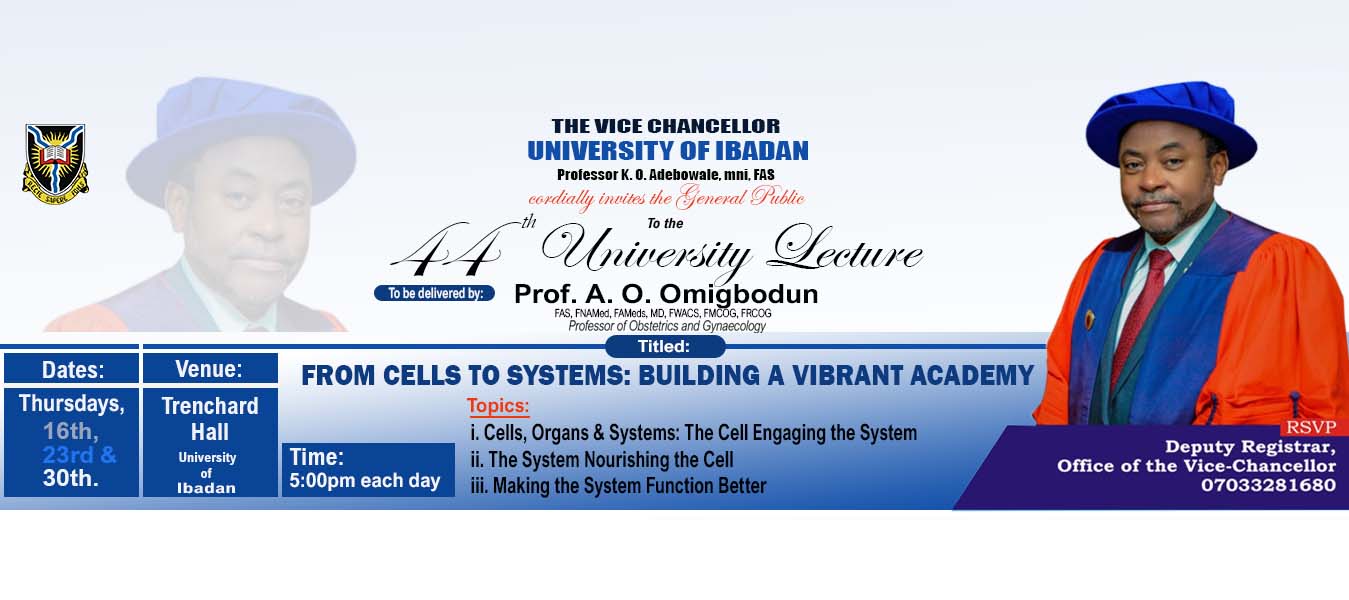The university exists to act as a Driver of Innovation in Society
"The university exists to act as a driver of innovation in society," says Professor Omigbodun
A Professor of Obstetrics and Gynaecology in the
Department of Obstetrics and Gynaecology, Faculty of Clinical Sciences, College of Medicine, University of Ibadan, Professor Akinyinka O. Omigbodun has submitted that the university exists to act as a driver of innovation in society even as it serves as a custodian of the values and virtues that characterise the community it is situated in.
He made the submission while delivering the first in the trilogy of lectures for the 44th University Lecture at the University of Ibadan.
The broad title of the lecture is: "From Cells to Systems: Building a Vibrant Academy," while the topics are:
■ "Cells, Organs and Systems: The Cell Engaging the System"
■ "The System Nourishing the Cell"
■ "Making the System Function Better."
Professor Omigbodun stated that the university receives input in terms of resources from society, transforming this into output (new knowledge and new scholars), shaping outcomes in the community, and having an impact on the quality of human existence in the long term.
In the metaphorical framework in which he delivered his narration, Professor Omigbodun said that the cell is the person, the tissues and organs are units of the University, and the system is the University of Ibadan adding that the University itself is part of the organism that is Nigeria's higher educational sector.
According to him, the strength of the system is in the individual cells and how they come together to form tissues and organs.
The main focus of his lecture was on ‘the system', but he dwelt extensively on some individual cells and also made some references to the organism of which the system is a part.
He said that the university, particularly if it is publicly funded, is an open system because it interacts with the external geographical, political, socio-economic, cultural, and technological environment.
The strength of the system, he said, is in the individual cells and how they come together to form tissues and organs that play their respective roles in ensuring the proper functioning of the system, within the organism.
The University Lecturer listed some of his contributions to the system to illustrate how cells can be nourished by systems, and the cells later returning the favour by adding to the strength of the system and nourishing other cells.
He added that these examples of exercising leadership in nourishing what could be described as the stem cells (undergraduates), empowering the mature cells (their trainers) through appropriate training, involvement in sustainable international collaborations, and promoting mentorship of the next generation of cells are all attributes of a cell determined to fully engage with the system and make a positive difference.
In the second part of this trilogy, Professor Omigbodun intends to explore how the system can nourish cells so that the cells could in turn, make the system stronger and better.
At the end of the trilogy, he shall explore suggestions on how to make the system even stronger in the face of the forces that are assailing it from multiple directions.
The Senate of UI approved the delivery of the University of Ibadan Lectures in 1971, and so far, forty-three, such lectures have been delivered.
Unlike inaugural lectures, where every Faculty gets at least one slot each year, only one Faculty (in rotation) gets to nominate a professor to deliver the annual University of Ibadan trilogy of University Lectures.

